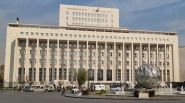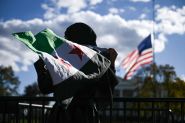- Home
- Middle East
- Aleppo: Christmas Amid Hope and Concerns for Christians

Brother Georges Sabe, who earlier this week took part in a meeting between Syrian rebels and local Christian representatives, poses in an Aleppo chapel on December 12, 2024 ©Ozan KOSE / AFP
Where should the crown be placed? In the courtyard of the Marist Brothers in Aleppo, one of the eleven Christian communities in Syria’s second city (northwest), the question that is sparking debates is about the Christmas tree.
Just days after their swift conquest of power in Damascus on December 8, the new rulers of the country, former Islamist rebels, have worked to reassure the Christians.
With success, at least "for now," notes Brother Georges Sabe, who attended a meeting in Aleppo on Monday, which for the second time included bishops and representatives from all congregations. Imams were also received in another meeting.
"They were very reassuring: continue to live normally, your Christmas is approaching, nothing will change for you," says this religious leader. "Nothing has changed so far."
All his interlocutors, "three soldiers and two politicians, were people from Aleppo," he notes. "One of them was finishing his mechanical engineering doctorate here before the war."
"A normal life"
"So, we’ve resumed a normal life, with Mass in the morning and evening. We just moved the evening Mass by an hour, and we’ve started setting up the nativity scenes and Christmas trees. I’ve learned over thirteen years of war to live day by day. We’ll see tomorrow."
In this secular country, New Year’s Day, Christmas, and both Catholic and Orthodox Easters have always been public holidays. "We’re waiting for the new calendar," he adds.
Of the approximately 200,000 Christians in Aleppo before the war began in 2011, only 30,000 remain in the city. It is a well-integrated community, present in the province since the 4th century, with more than seven hundred listed buildings, and which considers itself primarily "Syrian."
"We don’t want to leave; we want to stay in good relations with the Muslims, we speak the same language," insists Brother Georges.
"The bells will ring," his interlocutors promised him. Thursday evening at the 5 p.m. Mass at the St. Francis Latin Cathedral, about a hundred parishioners gathered.
Concerns
"People here have a strong spiritual sense. Throughout these years of war, they never stopped coming to church," assures Father Bahjat.
He understands the concerns that have been expressed, especially from abroad. "But on the ground, we have not faced discrimination," he swears under the golden stone porch of the church.
"The bishop told us he was reassured and that we would continue as before, celebrating our Masses and our feasts," says Marina Ayoub, who never misses a service where she finds "hope."
Across from the church, the building once occupied by the Baath Party for over sixty years has been quickly reclaimed and the Vatican flag hung: during the meeting, government representatives promised not to touch the Church’s property.
The appearance of Prime Minister Mohammad al-Bashir on Monday evening, standing in front of both the Syrian flag and the white flag of the Islamists, caused some concern, acknowledges Brother Georges. "But the next day, during an interview on al-Jazeera, it had disappeared: this shows they are ready for dialogue," he says.
"They keep repeating that they will respect all faiths... The worst is never certain, but I’ll wait: I’ll judge them by their actions," says an engaged Christian who asked for anonymity and still fears the new government might become more authoritarian.
He watches for "small troubling signs," noting that "restaurants in Aleppo no longer serve alcohol: they hide it."
By Anne Chaon, AFP
Read more



Comments